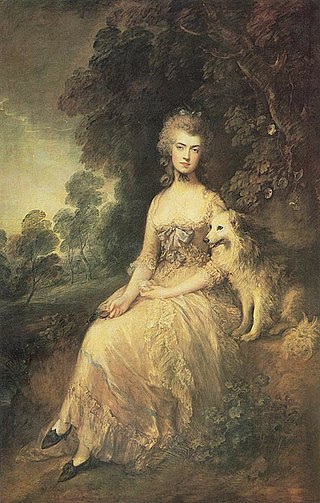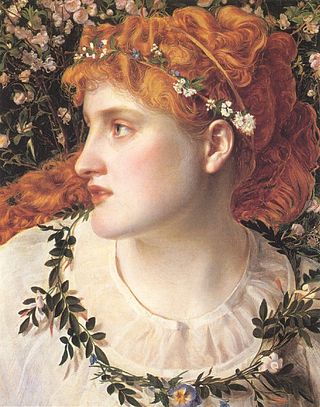
Chloe, also spelled Chloë, Chlöe, or Chloé, is a feminine name meaning "blooming" or "fertility" in Greek. The name ultimately derives, through Greek, from the Proto-Indo-European root *ǵʰelh₃-, which relates to the colors yellow and green. The common scientific prefix chloro- derives from the same Greek root. In Greek the word refers to the young, green foliage or shoots of plants in spring.

The Winter's Tale is a play by William Shakespeare originally published in the First Folio of 1623. Although it was grouped among the comedies, many modern editors have relabelled the play as one of Shakespeare's late romances. Some critics consider it to be one of Shakespeare's "problem plays" because the first three acts are filled with intense psychological drama, while the last two acts are comic and supply a happy ending.

101 Dalmatians is a 1996 American adventure comedy film produced by Walt Disney Pictures and Great Oaks Entertainment, with distribution by Buena Vista Pictures Distribution. It is a live action remake of Walt Disney’s 1961 animated feature film of the same name, itself an adaptation of Dodie Smith's 1956 novel The Hundred and One Dalmatians. Directed by Stephen Herek, written by John Hughes and produced by Hughes and Ricardo Mestres, it stars Glenn Close, Jeff Daniels, Joely Richardson, and Joan Plowright. Unlike the 1961 animated film, none of the animals speak.

One Hundred and One Dalmatians is a 1961 American animated adventure comedy film produced by Walt Disney Productions with distribution by Buena Vista Distribution. Based on Dodie Smith's 1956 novel The Hundred and One Dalmatians, the film was directed by Hamilton Luske, Clyde Geronimi, and Wolfgang Reitherman from a script by Bill Peet. With the voices of Rod Taylor, J. Pat O'Malley, Betty Lou Gerson, Martha Wentworth, Ben Wright, Cate Bauer, Dave Frankham, and Fred Worlock, the film's plot follows a litter of fifteen Dalmatian puppies, who are kidnapped by the obsessive socialite Cruella De Vil, wanting to make their fur into coats. Their parents, Pongo and Perdita, set out on a cross-country rescue mission to save their puppies from Cruella, in the process rescuing eighty-four additional ones, bringing the total of Dalmatians to one hundred and one.

Dorothy Gladys "Dodie" Smith was an English novelist and playwright. She is best known for writing I Capture the Castle (1948) and the children's novel The Hundred and One Dalmatians (1956). Other works include Dear Octopus (1938) and The Starlight Barking (1967). The Hundred and One Dalmatians was adapted into a 1961 animated film and a 1996 live-action film, both produced by Disney. Her novel I Capture the Castle was adapted into a 2003 film. I Capture the Castle was voted number 82 as "one of the nation's 100 best-loved novels" by the British public as part of the BBC's The Big Read (2003).

The Hundred and One Dalmatians is a 1956 children's novel by Dodie Smith about the kidnapping of a family of Dalmatian puppies. It was originally serialized in Woman's Day as The Great Dog Robbery, and details the adventures of two dalmatians named Pongo and Missis as they rescue their puppies from a fur farm. A 1967 sequel, The Starlight Barking, continues from the end of the novel.
Margaret Frazer, born Gail Lynn Brown, was an American historical novelist, best known for more than twenty historical mystery novels and a variety of short stories. The pen name was originally shared by Frazer and Mary Monica Pulver Kuhfeld in their collaboration on The Novice's Tale, the first of the Sister Frevisse books featuring the Benedictine nun Dame Frevisse. Their collaboration came to an end with The Murderer's Tale, the sixth book in the series. Starting with the Edgar Award-nominated The Prioress' Tale, the Margaret Frazer pen name was used exclusively by Gail Brown. She also wrote the Player Joliffe mysteries, starring the medieval actor Joliffe.

Mary Robinson was an English actress, poet, dramatist, novelist, and celebrity figure. She lived in England, in the cities of Bristol and London; she also lived in France and Germany for a time. She enjoyed poetry from the age of seven and started working, first as a teacher and then as actress, from the age of 14. She wrote many plays, poems and novels. She was a celebrity, gossiped about in newspapers, famous for her acting and writing. During her lifetime she was known as "the English Sappho". She earned her nickname "Perdita" for her role as Perdita in 1779. She was the first public mistress of King George IV while he was still Prince of Wales.

Cruella de Vil is a fictional character in British author Dodie Smith's 1956 novel The Hundred and One Dalmatians. A pampered and glamorous London heiress and fashion designer, she appears in Walt Disney Productions' animated feature film, One Hundred and One Dalmatians (1961), voiced by Betty Lou Gerson; in Disney's 101 Dalmatians II: Patch's London Adventure (2003), voiced by Susanne Blakeslee; in Disney's live-action 101 Dalmatians (1996) and 102 Dalmatians (2000), portrayed by Glenn Close; as well as Cruella (2021), portrayed by Emma Stone; and in many other Disney sequels and spin-offs.

Finchingfield is a village in the Braintree district in North Essex, England, a primarily rural area. It is approximately 6 miles (10 km) from Thaxted, farther from the larger towns of Saffron Walden and Braintree.

Mary Anderson was an American theatre actress.

Janet Johnstone and Anne Grahame Johnstone were English twin sisters and children's book illustrators best known for their delicate, detailed prolific artwork and for illustrating Dodie Smith's classic book The Hundred and One Dalmatians.

Perdita is one of the heroines of William Shakespeare's play The Winter's Tale. She is the daughter of Leontes, King of Sicily, and his wife Hermione.
In a group of animals, a runt is a member which is significantly smaller or weaker than the others. Owing to its small size, a runt in a litter faces obvious disadvantage, including difficulties in competing with its siblings for survival and possible rejection by its mother. Therefore, in the wild, a runt is less likely to survive infancy.
101 Dalmatians may refer to:

The 101 Dalmatians Musical is a musical produced by Luis Alvarez, directed by Jerry Zaks, and sponsored by Purina Dog Chow. The music written by former Styx member Dennis DeYoung, who also co-wrote the lyrics with the musical's book author B. T. McNicholl. Based on the 1956 children's novel The Hundred and One Dalmatians written by Dodie Smith, the musical follows a pair of Dalmatian dogs as they search through London in search of their litter of fifteen puppies, which were stolen by Cruella DeVil to make dog skin fur coats. The musical features Rachel York as the infamous Cruella DeVil, and has actors sharing the stage with fifteen real Dalmatians and using stilts to simulate the novel's original canine perspective.

101 Dalmatians is an American media franchise owned by The Walt Disney Company and based on Dodie Smith's 1956 novel The Hundred and One Dalmatians. It began in 1961 with the release of the traditionally animated feature film, One Hundred and One Dalmatians. Various adaptations produced from Disney have been released over the years.
101 Dalmatians is a musical with music and lyrics by Douglas Hodge and a book by Johnny McKnight from a stage adaptation by Zinnie Harris, based on the 1956 children's novel The Hundred and One Dalmatians by Dodie Smith.














